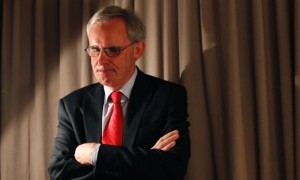In a time of surveillance, you can’t be too paranoid
This post is by Diploma/MA Journalism student, Ed Ludlow
As a trainee journalist, no matter in what medium you ply your trade, it can be no bad thing to listen to the experiences of someone whose work has changed the face of journalism and what it means to be a journalist.
We welcomed Ewen MacAskill from the Guardian today. He is best known for his work on Edward Snowden’s expose of US security and intelligence services, which in his view “should never be beyond democratic scrutiny.”

Having already listened to a number of speakers from the industry, it was reassuring to hear Ewen join them in the sentiment that “it’s a great time to be a journalist.”
The lecture was fascinating for a number of reasons and it’s impossible to fit in everything we learnt. Of course it was interesting to hear him explain more about those eight days in Hong Kong and the events that followed.
However, what we took from hearing about his experiences was there are realities, and even dangers, that we as journalists may face throughout our careers. He made it clear that we shouldn’t be naïve about that.
His most solid sound bite of advice was to never turn down an assignment, because there is no guarantee you will be asked again. MacAskill was asked by his editor Janine Gibson to fly to Hong Kong to meet with Snowden. Despite some concerns about the story, he flew the next day. The rest is history (yet the story rages on).
The next idea is that as journalists we sometimes have to put ourselves in the metaphorical firing line and it’s important that we are prepared for that. Broadcast Trainee Kathy Peart pointed out afterwards that Laura Poitras, the documentary journalist who accompanied him to Hong Kong, “was just as exiled as Snowden himself” after covering that story. Ewen has been stopped at airport security a number of times and the Guardian offices were raided by the Security Services to destroy files relating to Snowden. This all raised the idea that breaking stories has consequences and that should be always in our thinking.
Following on from that, Ewen made clear that we must protect our sources and ourselves. It is a changing and increasingly digital world. Through his experience, Ewen is a good guide to follow on what that means for a journalist. Encrypting emails, disabling digital location and other techniques are all now a part of the journalists tool kit, as well as taking technology out of the equation all together. How many of us would dream of going to an interview and leaving our phone at home?
The words “you should all be paranoid” were some that none of us expected to hear and nor was Ewen’s own admission of paranoia since meeting Snowden. Now it is an idea, which we all better understand. Ewen did not expect the story to erupt to that scale and still seems to not quite have come to terms with the fact that it is more than just a story.
